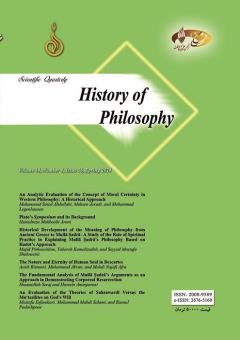-
-
List of Articles
-
Open Access Article
1 - Editor's Note
Hossein Kalbasi Ashtari -
Open Access Article
2 - An Analytic Evaluation of the Concept of Moral Certainty in Western Philosophy: A Historical Approach
Mohammad Saeid Abdollahi Mohsen Javadi Muhammad Legenhausen -
Open Access Article
3 - Plato’s Symposium and its Background
Hamidreza Mahboobi Arani -
Open Access Article
4 - Historical Development of the Meaning of Philosophy from Ancient Greece to Mullā Ṣadrā: A Study of the Role of Spiritual Practice in Explaining Mullā Ṣadrā’s Philosophy Based on Hadot’s Approach
Majeed Pirhoseinloo Tahereh Kamalizadeh Seyyed Mustafa Shahraeini -
Open Access Article
5 - The Nature and Eternity of Human Soul in Descartes
Asieh Bistooni Mohammad Akvan Mahdi Najafi Afra -
Open Access Article
6 - The Fundamental Analysis of Mullā Ṣadrā’s Arguments as an Approach in Demonstrating Corporeal Resurrection
Shamsollah Seraj Hosein Aminparast -
Open Access Article
7 - An Evaluation of the Theories of Suhrawardī Versus the Mu‘tazilites on God’s Will
Mostafa Esfandiari Mohammad Mahdi Salami Rasool Padashpour
-
The rights to this website are owned by the Raimag Press Management System.
Copyright © 2017-2026







